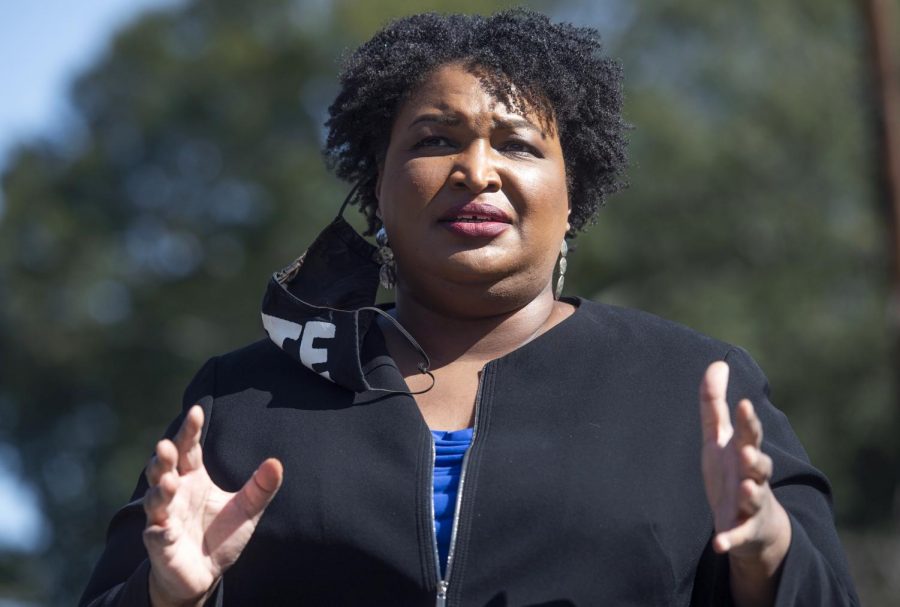GOP bills restrict and reduce minority voting
State legislative changes aim to shorten early voting periods and limit absentee voting
March 18, 2021
One of the most polarizing moments in American political history was undoubtedly the 2020 general election, an event that sent shockwaves through the entire nation, oversaw historic voter turnouts and was succeeded by a farrago of indignation, uncertainty and civil unrest. However, one of the most significant consequences of the election’s outcome is the GOP response to their sudden and seemingly holistic loss of governmental control. The implications that this reaction conveys regarding the general legislative goals of Republican lawmakers are wide-ranging and extremely dangerous.
In 43 states across the US, GOP lawmakers have introduced a variety of bills with one common goal: to make it as difficult as possible for certain demographics to vote. Unsurprisingly, the states that have encountered the brunt effects of these bills in the 2021 legislative session are also considered to be the iconic “purple” states, especially the ones that flipped from red to blue in the 2020 presidential election. This agenda has been strongly emphasized in both Georgia and Arizona.
Georgia, in particular, finds itself at the center of this controversy, with 22 proposed bills attempting to restrict voter access in the state. The 2020 presidential election marked the state’s momentous flip to blue, as it voted for a Democratic presidential candidate for the first time in 28 years. This critical upshot, which arguably secured President Joe Biden’s eventual victory, puts into perspective the motivation behind this new proposed voting legislation. Bills such as SB 241 heavily restrict absentee voting, indicating that residents of the Peach State would no longer be able to request an absentee ballot in order to avoid missing a day of work for the purpose of voting. African Americans, who make up the majority of Americans living in poverty, are distinctly being targeted by these bills as the demographic that likely cannot afford to miss a day’s wages.
In addition to this, controversial restrictive bills such as HB 494, HB 512 and SB 175 attempt to restrict early voting, of which African Americans are the largest participants. The racist repercussions of these bills — which were likely passed due to the fact that black and brown people tend to vote for Democratic candidates in the majority — are unsettling but they are not a novel phenomenon. The implementation of Georgia’s ‘exact match’ law in 2017 by then-Secretary of State, Republican Brian Kemp, attempted to disenfranchise about 53,000 Americans. It’s no coincidence that 76.3% of voters affected by such laws are Americans of color (Bloomberg City Lab)
Politician and voting rights activist Stacey Abrams leads the opposition to these new bills and isn’t afraid to call a spade a spade. “I do absolutely agree that it’s racist. It is a redux of Jim Crow in a suit and tie,” she said, “The only connection that we can find is that more people of color voted and it changed the outcome of elections in a direction Republicans do not like.” Abrams, who registered 800,000 voters of color in Georgia during the months preceding the election, has been accredited with delivering the state to the Democratic Party.
Though unnerving, the fact remains that Georgia simply serves as a microcosm of America as a nation. Bills targeting Americans of color, specifically African Americans, by reducing the early voting period have swept through multiple states including Washington, Tennessee, New Hampshire, North Dakota, Montana, Missouri, Minnesota and Iowa. Moreover, bills restricting absentee voting have been proposed in 34 states. The GOP lawmakers behind these propositions point to their goal of reinforcing the election process to avoid the voter fraud that they believe occurred in the 2020 presidential election — fraud of which they cannot provide any evidence. “We must pass laws to prevent election officials from jeopardizing the election process,” said Republican Gov. Greg Abbott. However, with no proof that the election process was ever jeopardized in the first place, this surface-level explanation exposes the GOP’s thinly veiled attempt to force a favorable outcome in the forthcoming 2022 and 2024 elections.
These proposed legislative changes come just after the storming of the United States Capitol on January 6th, another attack on American democracy perpetuated by Republican politicians. The former President Donald Trump, in particular, has engaged in spreading false narratives of voter suppression and election fraud in order to mobilize supporters of the GOP. These suppressive tactics are an affront to the principles of freedom that America was founded upon, principles that the Republican Party claims to hold in high regard.















